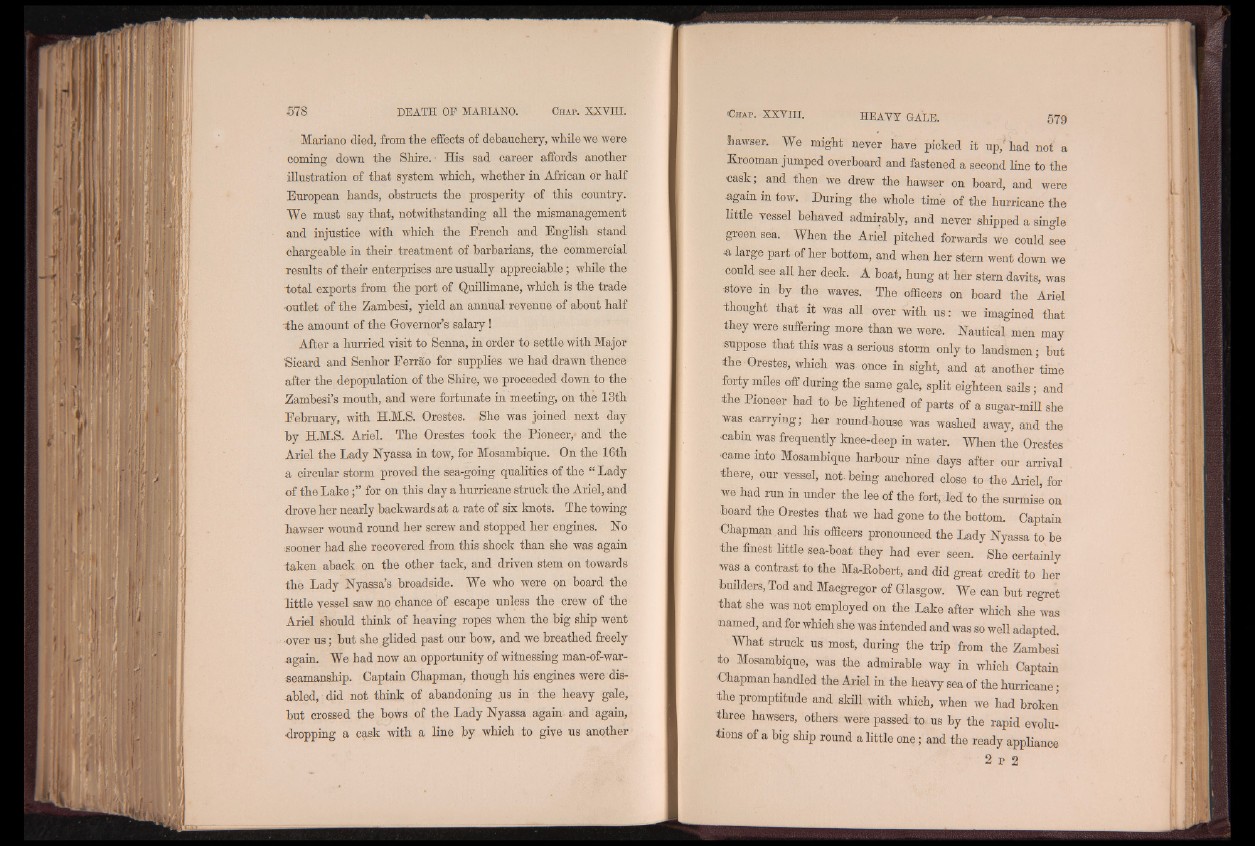
Mariano died, from the effects of debauchery, while we were
cominsr down the Shire. ■ His sad career affords another
illustration of that system which, whether in African or half
European hands, obstructs the prosperity of this country.
We must say that, notwithstanding all the mismanagement
and injustice with which the French and English stand
chargeable in their treatment of barbarians, the commercial
results of their enterprises are usually appreciable; while the
-total exports from the port of Quillimane, which is the trade
-outlet of the Zambesi, yield an annual revenue of about half
-the amount of the Governor’s salary !
After a hurried visit to Senna, in order to settle with Major
■Sicard and Senhor Ferrao for supplies we had drawn thence
after the depopulation of the Shire, we proceeded down to the
Zambesi’s mouth, and were fortunate in meeting, on the 13th
February, with H.M.S. Orestes. She was joined next day
by H.M.S. Ariel. The Orestes took the Pioneer,* and the
Ariel the Lady Nyassa in tow, for Mosambique. On the 16th
a circular storm proved the sea-going qualities of the “ Lady
of the L a k e f o r on this day a hurricane struck the Ariel, and
drove her nearly backwards at a rate of six knots. The towing
hawser wound round her screw and stopped her engines. No
sooner had she recovered from this shock than she was again
taken aback on the other tack, and driven stem on towards
the Lady Nyassa’s broadside. We who were on board the
little vessel saw no chance of escape unless the crew of the
Ariel should think of heaving ropes when the big ship went
•over u s ; but she glided past our bow, and we breathed freely
.again. We had now an opportunity of witnessing man-of-war-
seamanship. Captain Chapman, though his engines were disabled,
did not think of abandoning .us in the heavy gale,
but crossed the bows of the Lady Nyassa again and again,
•dropping a cask with a line by which to give us another
hawser. We might never have picked it up/'had not a
Erooman jumped overboard and fastened a second line to the
cask; and then we drew the hawser on board, and were
■again in tow. During the whole time of the hurricane the
little vessel behaved admirably, and never shipped a single
green sea. When the Ariel pitched forwards we could see
* large part of her bottom, and when her stem went down we
could see all her deck. A boat, hung at her stem davits, was
■stove in by the waves. The officers on board the Ariel
thought that it was all over With us: we imagined that
they were suffering more than we were. Nautical men may
suppose that this was a serious storm only to landsmen; but
the Orestes, which was once in sight, and at another time
forty miles off during the same gale, split eighteen sails; and
the Pioneer had to be lightened of parts of a sugar-mill she
was carrying; her round-house was washed away, and the
cabin was frequently knee-deep in water. When the Orestes
came into Mosambique harbour nine days after our arrival
there, our vessel, not - being anchored close to the Ariel, for
we had run in under the lee of the fort, Jed to the surmise on
board the Orestes that we had gone to the bottom. Captain
Chapman and his officers pronounced the Lady Nyassa to be
the finest little sea-boat they had ever seen. She certainly
was a contrast to the Ma-Eobert, and did great credit to her
builders, Tod and Macgregor of Glasgow. We can but regret
th at she was not employed on the Lake after which she was
named, and for which she was intended and was so well adapted.
What struck us most, during the trip from the Zambesi
to Mosambique, was the admirable way in which Captain
Chapman handled the Ariel in the heavy sea of the hurricane;
the promptitude and skill with which, when we had broken
three hawsers, others were passed to us by the rapid evolutions
of a big ship round a little one; and the ready appliance
2 p 2